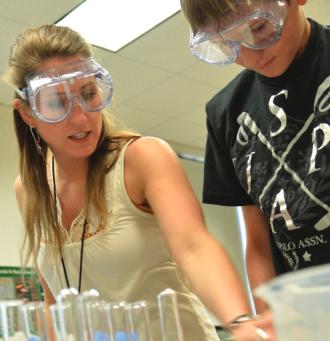ExpeRT-Earth grant planning workshop will result in proposal
By Elena Hines
College of Arts and Sciences staff writer
A grant planning workshop held in May went extremely well for a team from WMU applying for a National Science Foundation Improving Undergraduate STEM Education: Pathways into Geoscience (IUSE: GEOPATHS) grant.
“We’re going to go for a proposal,” said Dr. Heather Petcovic, an associate professor of earth science education who holds a joint appointment in the Department of Geosciences and the Mallinson Institute for Science Education and who is one of the recipients of the Interdisciplinary Research Award that allowed the workshop to take place.
Petcovic anticipates they will request a three-year, $350,000 grant for the Experiencing Research for Teaching Earth Science (ExpeRT-Earth) program. WMU had developed a similar program, ExpeRTS (Experiencing Research for Teaching Science), several years ago under the direction of Sue Stapleton with funding from the Howard Hughes Medical Institute (a grant that has now concluded).
ExpeRT-Earth would improve teacher training programs at WMU, giving teachers research experience so they are comfortable as scientists and as teachers.
“Teachers who think of themselves as scientists as well as classroom teachers do more with getting students involved in investigations,” Petcovic said. “They are not afraid to take risks and get kids involved in the process of doing science.”
Attendees of the workshop—which included representatives of the College of Arts and Sciences and the College of Education; the Graduate College; Lee Honors College; WMU’s community college partners (Kalamazoo Valley Community College and Lake Michigan College); the Kalamazoo Area Mathematics and Science Center; Extended University Program; teachers, students and leaders from the original ExpeRTS program; science faculty and science mentors—discussed how teacher preparation programs work and how ExpeRT-Earth might fit in.
They looked at the ExpeRTS program and data from interviews of six to eight former students — what stuck with them three to five years after their participation in the program; what were its strengths and weaknesses.
And they determined which elements of the program to retain and which could be improved.
The next step is follow-up, going through the information collected, Petcovic said.
“Our goal is to draft a proposal and bring the group together in late June or early July as an advisory board. If the proposal gets funded they can help shape the program.”
The grant is due in the fall.


